English
Választásirendszer.hu is a site (developed by Political Capital Institute (PC) and Social Development Institute) focused around collecting all available information on the Hungarian electoral law for experts, journalists and all who are interested. The site was launched in September 2011 and is regularly updated with analyses, publications, research and data.
The project is carried out with the support of the Think Tank Fund of the Open Society Foundations.
The project is led by Róbert LÁSZLÓ, election specialist, lecturer at National University of Public Service.
Analyses
- Knowledge about and attitudes of the Hungarian electoral system
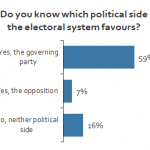 “Not even those who count it understand it.” It is a frequent experience that many Hungarians have this attitude on the electoral system. If a system is impossible to comprehend, the electorate does not see the link between the ballot cast and the composition of the Parliament, which, in the end, undermines trust in the ...
“Not even those who count it understand it.” It is a frequent experience that many Hungarians have this attitude on the electoral system. If a system is impossible to comprehend, the electorate does not see the link between the ballot cast and the composition of the Parliament, which, in the end, undermines trust in the ... - 7 statements about the referendum The one and a half year-long political campaign, which has been the most expensive one ever in Hungary, was not enough for a valid referendum. The 40% voter turnout shows that the campaign considerably underperformed the governing party’s expectations, the representatives of which had been talking about the importance of the validity of the referendum ...
- Dismantling direct democracy: Referenda in Hungary In populist or, rather, in illiberal systems, after the conquest of independent institutions, referenda and other tools of direct democracy (such as civic disobedience, protests, strikes) become even more important as units of the diminishing set of instruments used to assert people’s interests against those in power. Since 2010, the Hungarian government has been successful ...
- The new Hungarian election system’s beneficiaries On November 30, 2015, the Center for EU Enlargement Studies of the Central European University, with the support of the Budapest Büro of the Friedrich Ebert Foundation, has organized an international conference dedicated to the role of elections in young democracies of Central and Eastern Europe. With this international conference, CENS aimed to create an ...
- Political Capital’s reflections on the DGAP report
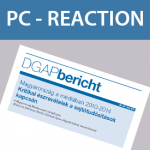 DGAP’s “Hungary in the Media, 2010–2014 – Critical Reflections on Coverage in the Press and Media” report received mixed reactions. Two Political Capital staff members were present at two out of the several background conversations organized to collect information for the study. As only a fraction of our findings and provided background materials were used ...
DGAP’s “Hungary in the Media, 2010–2014 – Critical Reflections on Coverage in the Press and Media” report received mixed reactions. Two Political Capital staff members were present at two out of the several background conversations organized to collect information for the study. As only a fraction of our findings and provided background materials were used ... - Transparency in campaign spending 2014-2015: fifty shades of grey Budapest, June 3, 2015 – Political parties likely spent close to HUF 11 billion on their campaigns in 2014 and 2015 at the parliamentary and municipal elections, as well as on the by-elections held in Veszprém and Tapolca. This was the main finding of the civil campaign monitoring study carried out by Átlátszó, K-Monitor, Political ...
- Votes of the Poor – public works and the perils of clean election It is patently clear: the poor are defenseless, and defenseless people are more likely to become the victims of election fraud. In Hungary public works schemes involving hundreds of thousands may increase these odds: while in the short term state-funded programs available for the unemployed and administered by municipalities may offer a slightly better life ...
- Jobbik won its first individual constituency – reasons and consequences
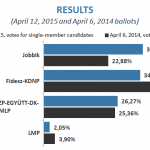 On April 12, the far-right Jobbik candidate won a by-election in the individual constituency of Tapolca. The election took place due to the death of former Fidesz MP Jenő Lasztovicza in early January 2015. The electorate dissatisfied with the performance of the government turns to the political side it considers capable of defeating Fidesz. On ...
On April 12, the far-right Jobbik candidate won a by-election in the individual constituency of Tapolca. The election took place due to the death of former Fidesz MP Jenő Lasztovicza in early January 2015. The electorate dissatisfied with the performance of the government turns to the political side it considers capable of defeating Fidesz. On ... - Fidesz’ defeat in Veszprém – Causes and consequences
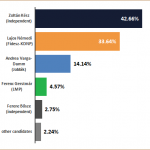 On February 22, in an electoral district in western Hungary, considered as a stronghold for the right, Zoltán Kész, an independent candidate supported by leftist opposition parties, beat his rival representing the ruling party by 9%. With this the Fidesz-KDNP coalition lost its two-thirds majority, and the defeat may have significant political repercussions.
Find our analysy ...
On February 22, in an electoral district in western Hungary, considered as a stronghold for the right, Zoltán Kész, an independent candidate supported by leftist opposition parties, beat his rival representing the ruling party by 9%. With this the Fidesz-KDNP coalition lost its two-thirds majority, and the defeat may have significant political repercussions.
Find our analysy ... - Five Statements About The Municipal Elections Five Statements About The Municipal Elections: 1. Rejection of politics is indicated by a steady decrease in political participation 2. Fidesz wins by losing 3. Left-wing parties are unable to attract new voters 4. Jobbik consolidated its position in urban centers 5. LMP is the biggest loser of the municipal elections Download the analysis in pdf here.
- The EU Will Survive
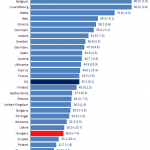 Key findings:
1. The strengthening of extremism is an important signal, but the EU-committed “mainstream” remains strong. If the notion of the crisis becomes stronger within the EU, the prediction of “Europe will fall” can fulfill itself.
2. Since the Eurosceptic parties often admit their Russian commitment, it is an open secret that their larger proportion of ...
Key findings:
1. The strengthening of extremism is an important signal, but the EU-committed “mainstream” remains strong. If the notion of the crisis becomes stronger within the EU, the prediction of “Europe will fall” can fulfill itself.
2. Since the Eurosceptic parties often admit their Russian commitment, it is an open secret that their larger proportion of ... - Hungarian Elections Dominated By The Right: Four More Years For Fidesz, Jobbik Gains Strength
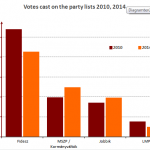 The Hungarian parliamentary election has left only one question open, whether the governing party can retain its two-thirds majority in Parliament or not. This question can remain open by 12 April, until the finalization of the election results. It has a real political significance: the two-thirds majority is the only thing that Fidesz can lose ...
The Hungarian parliamentary election has left only one question open, whether the governing party can retain its two-thirds majority in Parliament or not. This question can remain open by 12 April, until the finalization of the election results. It has a real political significance: the two-thirds majority is the only thing that Fidesz can lose ... - The Winner Takes It All – Analysis On The Impact And The Risks Of The New Electoral System Fidesz has implemented the most significant changes in the electoral system since the transition in 1989-1990. Below, we summarize the most important changes based on their impact on the electoral results. To sum up, we can say that the April 6 elections will be free but not fair: there are several changes in the system ...
- Sham Parties Could Drain Billions of Forints from Public Money
 Political Capital and Transparency International Hungary see a severe risk in the law on campaign financing; therefore they propose to amend Act LXXXVII of 2013.
The problem
For reasons elaborated below, the act on campaign financing adopted without prior professional consultation is as good as an invitation to establish sham parties. As a result, billions of HUF ...
Political Capital and Transparency International Hungary see a severe risk in the law on campaign financing; therefore they propose to amend Act LXXXVII of 2013.
The problem
For reasons elaborated below, the act on campaign financing adopted without prior professional consultation is as good as an invitation to establish sham parties. As a result, billions of HUF ... - New Electoral System in the Home Stretch In July 2013 it seems we have come to the end of a three-year process of electoral reform, but slight modifications may yet follow. Since the three new laws regulating Parliamentary elections (CCIII/2011 Voting Rights Act, XXXVI/2013 Electoral Procedure Act and LXXXVII/2013 Campaign Finance Act) have already been amended several times by the Fidesz-KDNP alliance, ...
- Access to Electoral Rights – Hungary
 It will be argued here that extending citizenship to Hungarian minorities abroad, supplementing the citizenship of non-residents with voting rights, and the attempt to introduce active registration appear to serve the same purpose: preserving and enhancing the power of the ruling coalition. A paper by ANDRÁS BOZÓKI.
Download the analysis in pdf here.
EUDO Citizenship Observatory
Robert Schuman ...
It will be argued here that extending citizenship to Hungarian minorities abroad, supplementing the citizenship of non-residents with voting rights, and the attempt to introduce active registration appear to serve the same purpose: preserving and enhancing the power of the ruling coalition. A paper by ANDRÁS BOZÓKI.
Download the analysis in pdf here.
EUDO Citizenship Observatory
Robert Schuman ... - Fewer obstacles, more campaign On 4 January 2013 Hungary’s Constitutional Court (CC) struck down the most important provision of the electoral procedural law, after president János Áder sent the bill to the CC for a constitutional review. The government has accepted the court’s decision, so a significantly more media-focused campaign than originally envisioned by the governing party is expected. ...
- Notes on the current phase of electoral reform in Hungary With a two-thirds majority in parliament, Hungary’s governing party alliance, Fidesz-KDNP, has created a completely new electoral system. The new electoral law was passed on 23 December 2011, and – among other things – has shifted the system towards the majoritarian principle: The proportion of single-member constituency mandates was increased from 45 percent to 53 ...
- Beware of the undecided! With the new electoral procedures act the governing party, Fidesz does its best to increase its chances of winning the 2014 general election with a combination of its heavily eroded voter base with Hungarian residence and non-resident Hungarian citizens. Preliminary registration may discourage a considerable number of unpredictable and disillusioned voters from going to the ...
- Preliminary registration on the horizon As an expected consequence of leading governing party Fidesz’s efforts to improve their 2014 election prospects by administrative means, mandatory registration will be introduced in the new electoral procedural law planned to be passed by November. The new institution is likely to rule out voters who are reluctant to go through the bureaucratic process in ...
